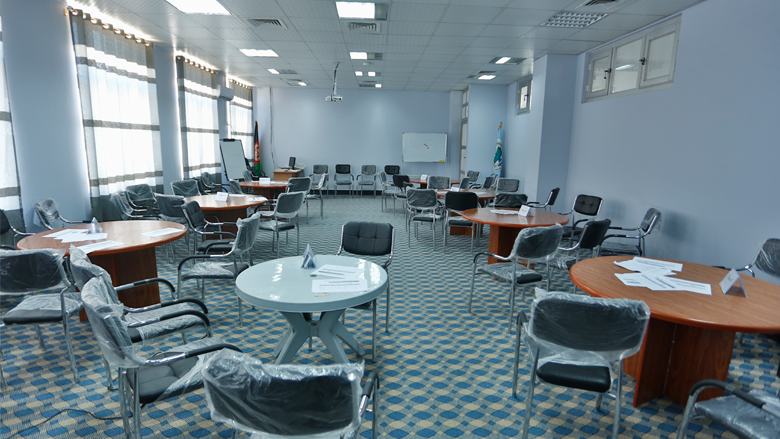Teaching at Kandahar University has changed, moving away from traditional methods to modern techniques and engaging students more effectively. This is an outcome of establishing Professional Development Centers (PDC) in public universities nationwide in 2017, a concept put forward by the Ministry of Higher Education.
Computer science lecturer Mahboobi, 38, and his colleagues from a range of faculties were among the first to embrace the idea at Kandahar University, when they designated a room in the literature department to host a PDC. What was once a multipurpose administrative storage room is now a welcoming, collaborative space for staff to learn, share, and innovate.
“It was very important to establish this center,” Mahboobi says, “because we know that [academic] development needs regular training and workshops to be aware of the new updates in the world.” The purpose of the PDC is to share the new findings, innovations, or changes in academia and administration, says Mahboobi.
The center, run by the university, was set up, furnished, and equipped under the Higher Education Development Project (HEDP). But the most important item that HEDP provided for the functioning of the center was electricity, says Mahboobi. “We have a solar power system that produces 6 kWh [kilowatt hour] of electricity for the center. The PDC has regular electricity and that has been a big support for conducting workshops.”
Each workshop sets out to tackle a different area that staff members at Kandahar University have identified for their improvement. The workshops have focused on modern teaching methods, research methods, quality assurance, accreditation issues, technical programs, and the benefits and use of e-learning technology in teaching and learning capacities.
Mahboobi emphasizes the importance of learning from each other: “Many of our lecturers and senior management staff attend international workshops and seminars and when they come back, it is very important that they share what they have learned in those workshops with faculty and students.”
“For example, I am going to Germany to attend a conference,” said Mahboobi. “The PDC has asked me, on my return, to share the findings and information that I have learned with other lecturers.”
Following a workshop on modern teaching methods and learning in which 125 teaching staff participated, Mahboobi was curious to know the real impact the professional development workshops had on students.
He and a few other participants from the PDC visited the classrooms of their university colleagues at random. The teacher was asked to leave their students with the visitors, says Mahboobi, to allow students to give honest feedback on the teacher’s performance.
Mahboobi found that the students were very happy that their teacher had participated in the workshop at the PDC, saying that the new teaching method was effective and they remained focused for the entire duration of class.
One of the teachers who attended the modern teaching methods workshop, Ahmadzai, 35, an English lecturer, says that he changed his teaching method after the workshop. “When I applied [what I learned] to my classes, the students became more interested in their lessons,” he says.
Another workshop he recently attended taught participants to create lesson plans and course policies, and design course materials. Now, Ahmadzai says, he can “draft a perfect lesson plan and design course materials.”

